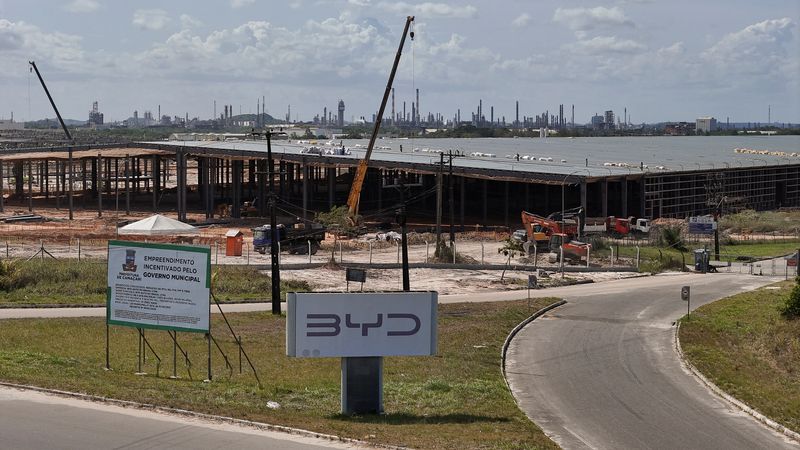
Written by Fabio Teixeira and Luciana Magalhães
Electric vehicle producer BYD (SZ:) has brought in hundreds of Chinese workers on illegal visas to build a factory in Brazil, a chief labor inspector told Reuters on Tuesday, adding that the company has pledged to comply with local labor laws for workers remaining in Brazil. nation.
It emerged last month that 163 of these workers, hired by Jinjiang contractor BYD, were working in “slavery-like conditions.”
Lianne Durao, who led the investigation announced in late December, said the 163 workers rescued by labor authorities in December were leaving or had already left Brazil.
“All of this was illegal,” Durau said, adding that BYD would be fined for each worker found in this situation, without clarifying the total amount that would be paid.
She said that the company agreed to modify the conditions of hundreds of workers who will remain in the country, to comply with Brazilian labor laws. She added that about 500 Chinese workers were brought to work in the Brazilian factory.
BYD and Jinjiang did not immediately respond to a request for comment. BYD had previously said it had cut ties with Jinjiang, which is contesting the accusations of the Brazilian authorities.
A person close to BYD told Reuters that the Chinese company believes the visas were issued correctly and that all employees came voluntarily to work in Brazil.
The factory has become a symbol of China's growing influence in Brazil and an example of the close relationship between the two countries.
Labor authorities and representatives of BYD and its contractors working in Bahia met on Tuesday to negotiate how to protect the rights of all workers employed at the plant.
Key to BYD's global expansion
BYD is building the plant to initially produce 150,000 cars as part of plans to start production in Brazil, its largest market outside China, at the beginning of this year. It is unclear whether construction will be delayed due to the investigation into working conditions at the plant.
It has invested $620 million to establish the Bahia factory complex alone. Nearly one in five BYD vehicles sold outside China in the first 11 months of 2024 were in Brazil.
In December, the state prosecutor's office described the workers, hired by Chinese construction company Jinjiang Group, as victims of human trafficking. Investigators said the company seized the passports of 107 workers.
Slavery investigations could have serious consequences for employers in Brazil, including restrictions on their access to bank loans.
Since the workers were found in slavery-like conditions, the Brazilian government has suspended BYD's temporary visa issuance.
Reports of wrongdoing in Bahia could be a major sticking point in bilateral relations.
Brazil has long sought more Chinese investment. But Beijing's model of transporting Chinese workers to countries in which it invests poses a challenge to local job creation, a priority for President Luiz Inacio Lula da Silva.

The investigation has also brought unwelcome attention to BYD as it seeks to expand globally and build on its dominance in China, the world's largest auto market, where it makes up more than a third of the market for electric and hybrid vehicles.
Durau said labor inspectors will continue to monitor BYD's construction site to ensure that workers still working at the plant are not subjected to abusive working conditions.







